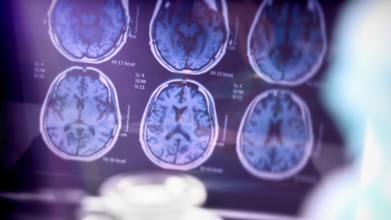- Health Conditions A-Z
- Health & Wellness
- Nutrition
- Fitness
- Health News
- Ayurveda
- Videos
- Medicine A-Z
- Parenting
- Web Stories
What Is Tylenol? Can It Really Be Linked to Autism? Doctors Explain

Credits: Canva
Acetaminophen: President Donald Trump announced that the US Food and Drug Administration (FDA) would advise doctors to avoid routine use of Tylenol during pregnancy due to a possible link to autism. He stated, "They are strongly recommending that women limit Tylenol use during pregnancy unless medically necessary," such as for treating fever "if you can't tough it out." Trump added that the main ingredient in Tylenol, paracetamol (acetaminophen), "is no good" for pregnant women except in extreme cases.
These statements caused confusion among many expecting mothers. We spoke to Dr. Archana Dhawan Bajaj, Gynaecologist and IVF Expert at Nurture, for clarity.
What Is Tylenol?
Tylenol, also known as paracetamol or acetaminophen, is a commonly used medication for treating fever and mild to moderate pain, available both over-the-counter and by prescription. Dr. Archana Dhawan Bajaj explains, "As a gynaecologist, I often get questions from expecting mothers about the safety of popular medications during pregnancy. Tylenol has long been considered relatively safe when taken in recommended doses. It is generally preferred over other painkillers like ibuprofen, which are avoided in later stages of pregnancy."
Side Effects Of Tylenol
When used as directed, paracetamol is usually well-tolerated. Some people may experience mild nausea or stomach upset. Overdose, however, can cause severe liver damage or even failure, which can be life-threatening. Symptoms of overdose may include loss of appetite, nausea, vomiting, abdominal pain, sweating, and confusion, according to Drugs.com.
Can Tylenol Lead to Autism?
There has been public concern about a possible connection between paracetamol use during pregnancy and autism in children. Dr. Archana Dhawan Bajaj assures, "While some observational studies have suggested a potential link, these do not prove a direct cause-and-effect relationship. Larger and more controlled studies, including sibling-control studies, have not confirmed that acetaminophen use during pregnancy causes autism spectrum disorders."
Why Treating Fever Matters During Pregnancy?
Dr. Archana emphasises, "Medications are prescribed for a reason. High fever or untreated infections during pregnancy can pose serious risks to both mother and baby, including preterm birth and impaired fetal growth. In many cases, leaving a fever untreated is more dangerous than using paracetamol. That is why doctors worldwide recommend it as the first-line therapy for fever and pain during pregnancy."
Tylenol: Safe Usage Guidelines for Pregnant Women
"The principle in pregnancy is always to take the lowest effective dose for the shortest possible time," says Dr. Archana. She adds, "Routine or long-term use of paracetamol without medical supervision is not advised. But when taken in moderation and at the correct dose, it is safe for managing fever or pain."
What Is Autism Spectrum Disorder?Autism spectrum disorder (ASD) is a complex neurodevelopmental condition with no single medication to cure it. Early detection and intervention remain the most beneficial. "Behavioral therapy, speech and occupational therapy, social skills training, and supportive educational environments are crucial for helping children with autism reach their potential. Medications may be used to manage associated symptoms like hyperactivity, anxiety, or sleep disturbances, but early therapy and family involvement are the main pillars of treatment," she explains.
ALSO READ: Trump's Claim On Linking Tylenol And Autism Is Unscientific, According To Doctors
In conclusion, Dr. Archana Dhawan Bajaj reassures, "Tylenol or paracetamol continues to be one of the safest options for treating fever and pain during pregnancy. Its long-term safety is still being studied, but current evidence does not indicate a link to autism.”
ALSO READ: What Is Leucovorin - The Drug Trump Suggests As A Treatment For Autism?
Disclaimer: Pregnant women should not panic based on incomplete information. Every medical decision should balance risks and benefits, and the best approach is always to discuss it with your doctor rather than relying on public opinions or conflicting reports.
Is It Safe To Have Sex With Heart Disease? Expert Tells 5 Things You Should Keep In Mind

Credits: Canva
Recovery after a heart attack or living with heart disease can vary greatly from person to person. Adjusting to daily life following a heart disease diagnosis can feel daunting. From deciding what foods are safe to eat, to wondering how much physical activity your body can handle, these concerns can affect every aspect of your routine.
A common question among patients is whether sexual activity is safe with heart disease, or if it might place undue stress on the heart. We spoke with Dr. Kajal Singh, Associate Professor in the Department of Obstetrics and Gynaecology at NIIMS Medical College and Hospital. She shares her insights on whether it is safe to be sexually active while managing heart problems and what precautions should be taken.
Is It Safe To Have Sex After A Heart Attack?
Sex is often considered a moderate form of physical activity, comparable to climbing one or two flights of stairs. It is understandable that individuals with heart conditions, especially after surgery or medical procedures, may worry about the strain sexual activity could place on their heart. According to the American Heart Association, most people can resume their usual sexual activity within a few weeks following a heart attack. Experiencing a heart attack during sexual activity is uncommon. To minimise the risk of heart-related complications, maintaining regular exercise or participating in cardiac rehabilitation is recommended.ALSO READ: Childhood Obesity Is On The Rise, Doctors Warn; Here’s What Parents Can Do
Sex affects the body similarly to other forms of exercise and can even benefit cardiovascular health. Experiencing sexual arousal after a heart attack generally does not pose a danger.
Can Heart Problems Affect Your Sexual Health?While sexual activity is usually safe for people with heart disease, Dr. Kajal Singh highlights several considerations and outlines five scientific ways heart disease can influence sexual health:
Reduced Cardiovascular Endurance:
Sexual activity requires physical exertion akin to climbing stairs. Heart conditions such as coronary artery disease or heart failure can lower cardiac output, causing fatigue and shortness of breath during intercourse. This can reduce both sexual frequency and satisfaction.Vascular Insufficiency:Proper blood flow to the genitals is essential for arousal and lubrication. Atherosclerotic changes, common in heart disease, can limit pelvic blood circulation, leading to decreased arousal and lubrication. Dr. Singh notes that post-menopausal women may also experience dyspareunia, or painful intercourse.
Medication Side Effects:Drugs like beta-blockers, diuretics, and certain blood pressure medications can reduce libido and affect orgasm. These medications may influence the nervous system or cause vaginal dryness, impacting sexual response.
Psychological Impact:
Following a cardiac event, anxiety or fear of another episode can create mental barriers to intimacy. “This may result in low sexual desire, arousal difficulties, and reduced emotional connection between partners,” explains Dr. Singh.Hormonal and Autonomic Dysregulation:Chronic heart disease can alter hormone levels, including oestrogen and androgens, which may affect sexual desire and vaginal health. Autonomic dysfunction can also impair genital responses, further influencing sexual satisfaction.
Dr. Singh stresses the importance of open communication about sexual health for those with heart conditions. With guidance from cardiologists, counselling, and supportive measures such as pelvic physiotherapy and lubricants, sexual well-being can often be preserved or restored despite heart disease.
India Gets Its First Non-Invasive FDA-Approved Test for Alzheimer’s Detection, Here's All You Need To Know

Credits: Canva
A major step forward has been taken in the fight against Alzheimer’s disease in India. For the first time, a non-invasive and comprehensive test, approved by the US Food and Drug Administration (USFDA), has been launched in the country. The test, called Dendrite Dx, aims to bridge the significant diagnostic gap for this life-altering neurodegenerative condition.
What Is Dendrite Dx?
Developed and launched by Dr Dangs Labs, Dendrite Dx offers a three-part approach to assessing Alzheimer’s risk. It includes:
- A 15-minute FDA-cleared cognitive assessment
- Advanced blood biomarker tests to detect key proteins associated with Alzheimer’s
- And a proprietary APS2 score generated in collaboration with a US-based diagnostic lab
The Amyloid Probability Score 2 (APS2) ranges from 0 to 100, indicating the likelihood that a patient has amyloid plaques in the brain, one of the hallmarks of Alzheimer’s.
Though the exact pricing is yet to be finalized, the test is expected to cost around ₹10,000.
Why This Test Matters
Speaking about the need for such a diagnostic tool, Dr Navin Dang, founder and director of Dr Dangs Labs, explained that Alzheimer’s patients in India often face difficulty in getting a definitive diagnosis, as reported by The Print. Currently, the standard options include lumbar puncture—an invasive procedure that extracts cerebrospinal fluid, or MRI scans, which can only give indicative results.
“This test,” Dr Dang said, “fills a huge unmet need for accurate and non-invasive Alzheimer’s detection in India.”
Early detection is crucial for Alzheimer’s. It empowers patients and their families to access treatment options, plan care, and maintain quality of life, even though a cure does not yet exist.
The Growing Burden of Alzheimer’s
Alzheimer’s is a progressive brain disease that affects memory, thinking, and behavior. Globally, nearly 57 million people lived with Alzheimer’s in 2021, according to the World Health Organization.
In India, around 8.8 million people above the age of 60 are believed to have dementia and Alzheimer’s. Disturbingly, symptoms are now being reported in younger people as well, sometimes as early as age 45.
The disease is strongly associated with abnormal build-up of beta-amyloid proteins, which can damage brain cells and disrupt normal functioning.
Who Should Consider the Test?
The Dendrite Dx test is indicated for adults who:
- Have a family history of Alzheimer’s or dementia
- Experience brain fog, memory lapses, or poor concentration
- Or live with lifestyle-related risks such as diabetes, obesity, or hypertension
It is available in three packages—basic, advanced, and confirmatory—depending on patient needs.
Inside the Test: Biomarkers
In its basic form, the test uses blood biomarkers such as pTau-217 (a highly specific Alzheimer’s marker) and amyloid beta 1-42 (linked to amyloid plaque buildup).
The advanced version includes additional checks for the APO E gene, which indicates inherited risk, as well as broader health assessments covering inflammation, blood sugar control, and kidney health. These parameters can influence brain function, and when imbalanced, may manifest as poor memory, low focus, or mood changes.
Independent studies suggest that these blood-based tests have around 90% sensitivity and specificity, meaning they are reliable at detecting true cases and ruling out false ones.
Final Confirmation: The PrecivityAD2 Test
For patients who require further clarity, confirmation is offered through PrecivityAD2, developed by US-based C2N Diagnostics. This advanced blood test uses liquid chromatography tandem mass spectrometry, a highly specialised technology, to analyse specific compounds linked with Alzheimer’s pathology.
The results are provided as an APS2 score, giving clinicians and patients a reliable indicator of the likelihood of Alzheimer’s-related brain changes.
American Heart Association Says Psychological Distress After Heart Attack Can Increase The Risk Of Another Cardiac Event

(Credit-Canva)
As per American Heart Association second heart attack is said to increase the mortality risk of people, and doctors try their level best to ensure that it doesn’t happen. However, a new study reveals that the state of your mental health can greatly affect your risk of another cardiac event.
Being the leading cause of death, one person dies every 34 second from heart diseases (the Center of Disease Control and Prevention). In 2023, stats show that 919,032 people died due to the same reason, which means that 1 in 3 deaths in the US were due to cardiac reasons.
While heart attacks in itself are difficult to recover from, suffering a second one makes recovery even more intense. Doctors try their best to ensure that a second heart attack does not happen, further complicating the treatment, but a new study has revealed a factor that can increase its risk?
How Your Mental Health Affects The Heart?
According to the American Heart Association study, experiencing PMPD, which is Postmyocardial Psychological Distress (PMPD) which many people experience after a major medical event like a heart attack can be physically and emotionally taxing can affect your risk of another heart attack.
PMPD isn't just an emotional issue; it's a medical one. It's linked to an increased risk of future heart problems, especially a recurrent heart attack. Some studies even suggest it contributes to a higher risk of suicide after an myocardial infarction (MI).
The link between your mind and heart is a two-way street. A heart attack can cause inflammation in your body, which leads to chemical changes that can trigger depression and anxiety. At the same time, chronic stress can activate your body's "fight-or-flight" response, raising your blood pressure and causing inflammation, making your heart condition worse. The numbers are clear:
- 1 in 3 heart attack survivors develop depression, which is much higher than in the general population.
- Up to half of heart attack survivors feel anxiety or stress while in the hospital, and for 20% to 30%, these feelings last for months.
- Depression and PTSD after a heart attack are each linked to double the risk of having another heart event or even death.
- People with anxiety are 1.3 times more likely to have another heart attack or die.
Emotional distress can also lead to unhealthy behaviors that harm your heart:
Poor lifestyle habits: Depression often leads to a lack of sleep, poor diet, and not being physically active.
Avoiding care: People with psychological distress may skip taking their medications, avoid social activities, or drop out of crucial cardiac rehabilitation programs.
Can Treating Mental Health Heal The Heart As Well?
Because of this strong connection, it's crucial to address emotional distress. Doctors are encouraged to ask about a patient's emotional state, even without a formal screening. Simply acknowledging their feelings and offering support can make a huge difference.
Therapy
Cognitive Behavioral Therapy (CBT), mindfulness exercises, and other forms of counseling can help people manage their emotions.
Medication
A class of antidepressants called SSRIs has been found to be safe and effective for people with heart disease.
Lifestyle Changes
Simple things like getting regular exercise and improving sleep can significantly boost your mood.
Cardiac Rehabilitation
This is a key resource that is often underused. In addition to physical exercise, these programs typically offer mental health support and stress management education, which has been shown to improve both mental and physical outcomes.
© 2024 Bennett, Coleman & Company Limited

